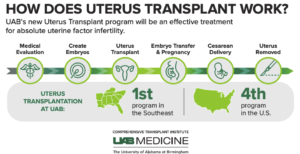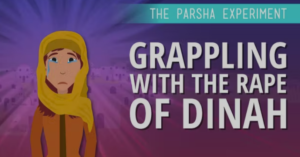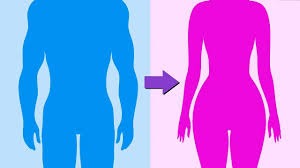Raboyseyee and Ladies,
Victim Shaming
As this week’s review is being written, the heylige Ois is on his way to Tzfat, Israel, where he will be spending Shabbis with the locals. Be on the lookout for a special edition in the coming weeks on the Ois’s extended trip to Israel.
Says the heylige Internet, azoy: On July 9, 2019, doctors at the Cleveland Clinic announced that they’ve achieved a first in North America: delivering a baby from a uterus that had been transplanted from a deceased donor. The healthy baby girl was delivered by C-section in June. That was only the second time such a delivery had happened worldwide, the first having occurred in Brazil in December.
The first reported transplantation of human fetal tissue took place in 1922, when a fetal adrenal graft was transplanted into a patient with Addison’s disease (Hurst et al., 1922). A few years later, in 1928, fetal pancreatic cells were transplanted in an attempt to treat diabetes mellitus (Fichera, 1928). In 2000 the world’s first womb transplant was performed on a 26-year-old woman in Saudi Arabia. She had lost her own womb as a result of heavy bleeding following the birth of her child. The first successful uterus transplant was performed in Sweden in 2014. As of late 2020, roughly 100 uterus transplants have been performed in the world, including about 30 in the United States.

Wow! But is this so amazing? And is this even emes? Seemingly not, because several thousand years earlier, and hundreds of years before Matan Toirah, the RBSO performed the first ever transplant of any type. We shall read all about it in this week’s parsha which also contains the ugly -and very sad- chapter of what befell Dina when she was taken -as in kidnapped- violated -as in raped, and worse, by a monster named Shechem. And we begin with these questions: Were our sages heartless? Are they guilty of victim shaming? We shall address these and other questions below.
This past shabbis, as the Ois was reading ahead in search of a topic, he came across a Rabaynu Bechaya who tells us that Dina -at the time of the ugly incident to which the heylige Toirah dedicates one entire chapter -consisting of 31 pisukim- an impressive number for one storyline- was but eight years and one month old at the time she was taken and raped. Shreklich! It’s disgusting and repugnant at any age, ober at eight? Well, blow me down. On the other hand, compared to Rivka who might have been three when she married Yitzchok and Rochel, who may have been five when we met her for the first time, Dina might have been a mature teenager; ver veyst. Let’s get right into it.
As Vayishlach opens, Yaakov is 97 years old (remember that number for later in the review), and it’s time to make peace with his eltere brider (older brother), Eisav. The actual encounter -34 years later- is far less dramatic than the buildup; isn’t it always, if you chap, and after preparations which consisted of a three-pronged strategy, including a military option, it’s all over with one big hug and kiss. Shoin: they make up, split up, and live happily ever after.
Our parsha features war games, kidnapping, rape, murder, and efsher a shtikel incest, oy vey. What it doesn’t feature is tranquility and nachas from the kinder (children), nebech. The Yaakov family is in distress, falling apart mamish, and the wheels on the proverbial family mini-van, are coming off. This week, the Ois will take a closer look at Dina, Yaakov’s only daughter. We have previously covered other storylines which include Reuven who mounted his mother’s bed, if you chap- which seemingly he did, and the passing of Rochel and Yitzchok; may they rest in peace. Devora -a Toirah character we hardly get to know dies, as does -according to some- Rivka. Rochel will be buried roadside; exactly where, ver veyst? Her resting place is hotly debated until today though thousands -including the Ois just last week- continue to pay respects at the tomb we believe to be hers. Yitzchok will be buried in Chevron without controversy by his twin sons, Yaakov and Eisav.
The action is fast and furious as we get to Chamishi where we read with shock, horror, dismay and disgust the very sad story of Dina. Who was Dina? Where did she come from and whose daughter was she really? Is that even a question? Didn’t we learn just last week that Leah gave birth to Dina? We did. Is there -chas v’sholom (heaven forbid)- any controversy regarding her lineage and yichus (pedigree)? Was her birth scandalous? The medrish is fully invested in at least two very creative blow your mind theories though the heylige Toirah tells us just who she was and that Leah was her mother. We don’t need the services of Maury Povich to figure things out. When it comes to the medrish however, there is avada room for other interpretations; is there not?
Says the Targum Yoinoson ben Uziel that originally Dina was conceived in Rochel’s womb; well, blow me down. And? The RBSO transferred her (fetus) after conception to Leah’s, so that Rochel could give birth to Yoisef instead. And how do you like that? Way before modern day scientists came up with various fertilization methods including in-vitro, surrogacy, and other gishmake methodologies, the RBSO was -as one would expect- trailblazing innovative paths to child bearing. Ober chap nisht (not so fast) because another medrish tells us a different story regarding Dina. Check this out: Leah was impregnated by Yaakov -who seems to be the only male in the picture- with a male fetus. A nais (miracle) occurred inside the fetus and the male fetus inside of Leah turned into the female Dina. A Houdini act mamish. No transplant was needed. Avada you heard of males acting like females, of males becoming females and farkert, as well as those in the midst of reassignment surgery and transformation. Today these surgeries are standard. Ober, only the RBSO could accomplish this in utero. Gevaldig mamish! There is also an opinion that Rochel and Leah were pregnant at the same time with Yoisef and Dina respectively, and that due to Leah’s davening (Brochis 60a), the fetuses were miraculously switched. One cannot make this up, unless one is a medrish of course.
Says the Alshich, azoy: Leah was pregnant with what was supposed to be a male. Yet, since that baby was to be the eleventh born to Yaakov Oveenu, even if Rochel were to be blessed with finally having a child (to be number twelve), both Bilah and Zilpa, Yaakov’s two additional shiksa wives, would have delivered more of the future shevotim (tribes) than Rochel. Leah therefore davened to the RBSO for her sister Rochel. The RBSO responded and turned Leah’s unborn male child into Dina. It is therefore no wonder, concludes the Alshich, that Dina was an outgoing person, a personality trait which seemingly will get her into some trouble as we will learn mamish in just a minute What’s pshat? Is outgoing so giferlich? Since her roots were of male origin, she possessed this male characteristic to be one who “goes out.” Going out -too often- seemingly leads to someone -the wrong person- going in, if you chap. Can’t make this up but want more? Says the Ibn Ezra (Bereishis 30:21) that Dina was Zevulin’s twin sister. Are you confused? Nu, you’re not alone. Says the Chida that Targum Yoinoson got it right: the babies switched wombs but clarifies his point on Leah’s tendency to be more outgoing by stating that Dina’s personality in her original womb was more girlish, shy and introverted. Ober, once she entered the womb of Lea who had Yoisef’s fetus cooking inside, she obtained male tendencies and as a result, ended up with the outgoing personality traits which led to the next part of this week’s Toirah.
The bottom line: now you know that our sages were mamish geniuses as they had -hundreds of years earlier- a handle on scientific advances that were to come about only in the early 1900’s. Many of the exegesis regarding fetus switching and twinning have their roots in the kabala and the Ois will zicher be asking these questions over shabbis from those who claim to be versant in this subject matter. Another bottom line: what came out of who, ver veyst, but we do know that Yaakov did the plowing and seeding and was the father to both Dina and Yoisef. As to the mother, ver veyst? Another thing we know with certainty: this Dina -at least according to several -too many to my liking- was a shtikel tzatzkela and got herself into one heap of a mess. What’s pshat? Let’s read the details innavenynig. Says the heylige Toirah -and some Rashi- (Bereishis 34:2), azoy:
| 2. And Shechem the son of Camor, the Hivvite, the prince of the land, saw her, and he took her, lay with her, and violated her. | ב. וַיַּרְא אֹתָהּ שְׁכֶם בֶּן חֲמוֹר הַחִוִּי נְשִׂיא הָאָרֶץ וַיִּקַּח אֹתָהּ וַיִּשְׁכַּב אֹתָהּ וַיְעַנֶּהָ: | |
| lay with her: in a natural way. — [from Gen. Rabbah 80:5] | וישכב אתה: כדרכה: | |
| and violated her: Heb. וַיְעַנֶהָ, lit., and afflicted her. [I.e. he was intimate with her] in an unnatural way. — [from Gen. Rabbah 80: 5] | ויענה: שלא כדרכה: | |
| 3. And his soul cleaved to Dina the daughter of Yaakov; he loved the girl and spoke to the girl’s heart. | ג. וַתִּדְבַּק נַפְשׁוֹ בְּדִינָה בַּת יַעֲקֹב וַיֶּאֱהַב אֶת הַנַּעֲרָ וַיְדַבֵּר עַל לֵב הַנַּעֲרָ: | |
| and spoke to the girl’s heart: [i.e. he spoke] seductive words, “Look how much money your father squandered for a small parcel of land. I will marry you, and you will acquire the city and all its fields.” – [from Gen. Rabbah 80:7] | על לב הנערה: דברים המתיישבין על הלב, ראי אביך בחלקת שדה קטנה כמה ממון בזבז, אני אשיאך ותקנה העיר וכל שדותיה: | |
Rashi (in italicized letters) understands that the minuvil Shechem took Dina and had his way with her. First kidarko (in a natural way), and then he did what? Rashi does not mince words and tells us that the word “Vayi-ah-neh-huh” means that he violated her in an unnatural way. This is Rashi talking and why he needed to get so graphic, ver veyst? Is there a reason he wanted us to conjure up these images as we sat in yeshiva at impressionable ages? Ver veyst? It worked! The bottom line: Dina suffered terribly at the hands -and other parts- of this swine Shechem who violated her.

Ober, does everyone agree that Dina was raped? Ibn Ezra and Radak assume the root “e-n-h” (in the sexual context) means to deflower a virgin but not rape. The RambaN holds ‘enah’ means rape. How and where they became such experts on rape, ver veyst? What’s the bottom line? Does anyone know with certainty? Were the authors of the medrish nearby when these unnatural acts went down? The bottom line: for whatever reason- perhaps because sex sells- most exegetes assume rape rather than seduction. The Baal HaTurim cites a position that it was seduction, but it rather seems that it is distinct from the position of Rashi and Ramban.
Let’s chazir (review): Dina went out and Shechem laid eyes on her. Shechem took her, slept with her, and violated her. Not nice! Of course, as we read the story, we feel mamish sick and terrible for what befell Dina. Ober, do our sages share our feelings? Do they tell us how terrible it was? Do they show Dina any rachmunis (pity)? Most didn’t; they blame Dina. It’s mamish shreklich. Does the Toirah mention anything else about Dina? Any follow up? How was she doing physically? Psychologically? Not one word. In fact, it’s farkert. The rest of the chapter is all about the proposed marriage, the offer from Shechem conveyed by his father, the counter offer, and what the brothers did to avenge Dina’s rape. Ober what about the victim? What became of her? Did she heal?
What does Dina, the victim tell us? Nothing! Not one word as she is given no voice at all in the heylige Toirah. Not one time in the 31 posik chapter, do we hear from her directly. Only that she was taken, violated and then saved by her brothers. Given the Toirah’s silence, our sages went to town and filled in the gaps as did Shechem, if you chap. We will never hear from or about Dina again though she is listed and counted as one of the original people who went to Mitzrayim along with Yaakov.

Did our sages show sympathy and paint Dina as the victim in this myseh? Most did not. Did they take advantage of the Toirah’s silence to further develop and color the story? Did they -on their own- decide to blame and shame Dina? Let us read what Rashi and a few others had to say, and perhaps why. Says Rashi quoting the medrish (Medrish Rabbah 80:1), azoy: Dina is called the daughter of Leah, but why not the daughter of Yaakov? Because she “went out” she is called Leah’s daughter, since she, too, was fond “of going out” as it is said (30:16) “and Leah went out to meet him.” Specifically, what that means we shall address below but a pleasant picture of Dina the medrish did not portray. With an allusion to her they formulated the proverb: “Like mother, like daughter.” The bottom line: Dina was not very chaste and may have gotten what she deserved. As well, Leah too is attacked.
And channeling chaver Josh Joseph -a dedicated student of the Haamek Davar we find this: Since Yaakov lived outside of town the posik should have said that she “came in.” However, Scripture wanted to hint that she “went out” of the guidelines of proper behavior by going to watch the locals dance and make merry. Does the heylige Toirah mention that she went out to watch the locals dancing? It does not! Do eight-year-olds typically go out to watch the locals? Not! do they go out dancing? More topically, they’re home with babysitters. The bottom line: according to this pshat, Dina went out to party, or to watch others party, and is wholly or at least partially responsible for what happened next. The bottom line: she put herself in danger.
Says the Or HaChaim, azoy: ותצא דנה בת לאה, Dina, Leah’s daughter went out, etc. The reason that the Torah emphasizes that Dina was Leah’s daughter (something that we are well aware of) is in order to facilitate understanding of the causes underlying Dina’s excursion into town. Dina was Leah’s daughter. Had she been Rachel’s daughter she would never have made such an unchaperoned excursion. Her mother Leah had “gone out” to meet her husband (30,15), something that was uncharacteristic of Jewish women. The bottom line: not just was Dina at fault but so was her mother Leah who was seemingly not a good enough parent. Leah went out? Where to? On what occasion was Dina’s mother, Leah, excessively outgoing? Shoin, let’s hearken back one parsha, to Vayeitzei, (30:14), where we learn that Reuven finds duddaim (mandrakes), a fertility drug or an aphrodisiac, and brings them to his mother, Leah. Rochel, who is barren and desperate for a child, insists on having them, and trades her night -of relations- with Yaakov for the mandrakes. That evening, when Yaakov returned from the field, he is met by Leah who brazenly insists that Yaakov spend the night with her, since she has “hired him” with her son’s duddaim. The commentators suggest that this immodest behavior proved ruinous for her daughter, Dina, who, following her mother’s example, went out into the lawless city of Shechem, and as a result was attacked. As an aside, since Leah -and ad hayoim hazeh (until today)- not one friend has reported that a wife has ever insisted that the husband sleep with her that evening. Farkert: they make every excuse not to.
As an aside, there are numerous other exegeses blaming Dina.Ober, does everyone agree that Leah’s outgoing personality and actions made her daughter guilty by extension, and perhaps herself culpable? Says the Abarbanel it’s mamish farkert (opposite): This [rape] did not happen to Dina because she was a girl who liked to “hang out.” She was Leah’s daughter and [Leah] was the one who stayed home all day whereas Rochel was the outgoing shepherdess. Also, from Yaakov’s side, he was the “dweller of tents,” and if the father is an internally focused person, how much more so, the daughter? This teaches that [Dina] didn’t go out for wrong reasons, G-d forbid. [She went out] only to see the girls in the land… since there were no other girls except her in Yaakov’s house, and she wanted to learn from them… as young girls tend to do.
Moreover, in the medrish, Leah’s assertiveness is praised by our Sages in another context as being positive, resulting in the birth of a righteous child with outstanding descendants. And says the Malbim azoy: Dina was innocent; she was but looking to mingle with girls. The posik clearly tells us that she went out to see “the girls.” Why then is she indicted as being a shtikel aggressive or even loose and that what came her way was what she brought upon herself? Why do many a medrish blame the victim? Ver veyst? There was clearly no provocation or lack of modesty. Was she out and about wearing form-fitting athleisure clothing that mamish accentuates every curve? Without a skirt to cover? Say it’s not so please. So happens that some blame Dina with causing this incident because she revealed her arm, only to be seized by Sh’chem. If her arm was enticing, you can only imagine what the rest had to offer.
And listen to this: Rashi’s comments in a previous episode -also in our parsha- suggest yet another reason for the rape of Dina. Before confronting his brother Eisav -after many years of estrangement- Yaakov quietly transfers his family to the other side of the river Yaabok. Says the heylige Toirah (32:23) that Yaakov arose that night, took his two wives, his two handmaids and his eleven sons and crossed the ford of the Jabbok. Asks Rashi so gishmak, azoy: “V’Dina hay’chahn hay’sah?” (Where the hec was Dina?) Why does the posik mention eleven sons, but not Yaakov’s daughter, Dina? Says Rashi -citing the medrish- that Yaakov had placed Dina in a sealed box so that Eisav would not lay his lecherous eyes on her and seek to marry the lovely girl. And says Rashi that despite the fact that Yaakov was trying to protect Dina from Eisav, Yaakov was punished. What? By keeping Dina from his brother, he prevented Dina from possibly influencing Eisav and perhaps returning him to goodness. Instead, she fell into the hands of Shechem. In other words: what happened to Dina was not her fault; it was her dad’s fault! Oy vey!

Dina had the potential to affect Eisav in a positive fashion? She was going to be mikarave (influence to the better) Eisav? What’s pshat? How was that going to work? Dina, as mentioned above, was approximately eight years old -some say eight and one month, and some say, as old as nine. And Eisav? Given that he was Yaakov’s twin, we can guess that Eisav is 97 years old. Can a nine-year-old control, and or influence a 97-year-old? Nu, we can only imagine that such influence would entail other favors, if you chap. it’s taka emes: Men will say anything, promise anything and do just about anything to get what they want. What’s taka pshat? Said the Darshan of Yerusholayim that we should never underestimate the power of a woman, seemingly even a nine-year old. “A Yiddishe veib (a Jewish wife) has herculean powers: when a Jewish woman puts her mind to something, she can surely achieve it. According to this pshat, eight -or nine-year-old Dina– given the opportunity, could have done miracles with Eisav and better influence him than the combination of Avrohom, Yitzchok and Yaakov. We know where this power comes from, if you chap. Shoin! The bottom line: what befell Dina may have been Yaakov’s fault. Shoin, the RBSO punished Yaakov for being a weisenheimer and not allowing Eisav to marry Dina.
As to Dina, said the Lubavitcher Rebbe, azoy: Dina’s going out is a credit to her. Being outgoing was a positive attribute since she had the potential to positively influence others. Blaming the victim only further stigmatizes abuse. And that’s why we love the Lubavitcher Rebbe! And taka says the Ramban that this story teaches the praise of Dina – לספר בשבחה – in that she remained true to her values as a daughter of Israel. And now you know.

What became of Dina post Shechem? Did she recover from the trauma? Her fate is -of course- the subject of much rabbinical speculation; let’s examine a few. Many say that Dina became pregnant and had a child through Shechem, pig that he was. But what about the heylige Gemora which tells us that an eight-year-old cannot become pregnant? What about it? Ober, that does not necessarily mean that this didn’t happen; let u snot confuse the heylige Gemora with the medrish where anything goes. Pirkei de-Rabbi Eliezer states that Dina had a baby girl, Osnas, whom we will meet and read all about next week. She was seemingly the daughter of the union. Yaakov’s sons wanted to kill the baby, so it would not be said that there was harlotry in his tents. The RBSO sent a malach (angel) to bring her to the house of Potiphar in Mitzrayim. (had the yeshiva of Shaim and Ever been co-ed, perhaps she would have been flown there instead ?!) Says the Mechilta de-Rebbe Yishmoel that the brothers were forced to drag Dina out, because she was too ashamed to leave Shechem’s house. The Yalkut says that once she had tasted intercourse with this uncircumcised goy, she was happy, and didn’t want to leave. I quote him verbatim. Finally, Shimon vowed that he would marry her. They wed, and a son was born from this union. His name: “Saul the son of a Canaanite woman.” The rescue was carried out by Shimon and Levi together; why Shimon got the sister and not Levi, ver veyst, but Shimon is the presumed groom. Efsher because he was older? Or maybe, this is a way to save Shimon from the perceived error of marrying a shiksa Canaanite. Later in Shmois (6:15), we’re introduced to Shaul, the son of Shimon and “a Canaanite woman.” Yaakov’s kids couldn’t find a nice Jewish girl to marry? Was there a shidduch crisis brewing way back then? Says the medrish azoy: this woman is actually Dina, and Shaul is the son she had with Shechem. Which was it? A boy, or a girl? Or was it the girl Osnas with Shechem and the boy Shaul with her brother? Both? Ver veyst?
Dina was married to her brother Shimon? According to one opinion in the heylige Gemora (Buba Basra 15b), Iyov lived in the time of Yaakov Oveenu, and it was he who married Dina.
The good news: Though Yaakov’s family was somewhat dysfunctional and though one son may, or may not, have married his own sister and though many others had issues as we will learn in the coming weeks, they are still referred to as the Shivtay Ko, the holy tribes of G-d. None of this nonsense seems to have bothered the RBSO. And the good news? There’s still hope for some of you.
A gittin Shabbis-
The Heylige Oisvorfer Ruv
Yitz Grossman
